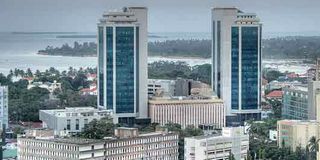Tanzania Revenue Authority faces uphill task in the last quarter of 2019/2020

Dar es Salaam. A total of Sh13.7 trillion in revenue was collected in Tanzania Mainland during the first eight months of the current financial year, which is Sh1 trillion below the Sh14.7 trillion target.
The Bank of Tanzania (BoT) monthly economic review for March shows that central government revenue amounted to Sh13.3 trillion, lower than the estimated Sh14.2 trillion, while local government revenue were Sh496.2 billion, lower than the estimated Sh513.3 billion.
This means that the Ministry of Finance and Planning, through the Tanzania Revenue Authority (TRA) needs to collect at least Sh2.5 trillion per month to get Sh10 trillion in the remaining four months, to reach budgeted Sh23.04 trillion.
The Government plans to spend a total of Sh33.2 trillion ($14.3 billion) in the financial year 2019/20, an increase of 1.9 percent to the 2018/19 budget.
A total of Sh20.9 trillion ($9.08 billion) allocated to recurrent expenditures, while development expenditures budgeted at Sh12.2 trillion ($5.3 billion).
With an ongoing Covid-19 pandemic, associated with slowdown of business activities, it will be challenging to collect targeted revenue for remaining months.
It the report, BOT has indicated that the impact of Covid-19 pandemic on Tanzania economy was mild up to February 2020 because countries had not imposed trade restrictions and lockdown.
“There was also lagged impact linked with shipment of imports and exports,” BoT says.
“As the spread of the pandemic disease deeply intensified towards the end of February 2020, the impact on the economy became visible in March 2020.”
BoT has noted that the extent of the impact on the economy and policy responses taken to cushion the economy will be reported in the subsequent publications of Monthly Economic Review.
In June last year, minister for finance and planning Dr Phillip Mpango said Sh23 trillion will be collected internal revenue sources, Sh5 trillion through borrowing from local financial institutions, Sh2.3 trillion from foreign loans and Sh2.8 trillion from development partners.
The review shows tax revenue during the period of eight months ended in February amounted Sh11.8 trillion, lower than estimated Sh12.3 trillion.
In current financial year, the government budgeted to collect Sh18.9 trillion from tax revenue.
Taxes on imports also fell short during the period after the ministry recorded Sh4.2 trillion, lower than estimated Sh4.43 trillion.
However the amount was nearly 60 percent of budgeted Sh6.7 trillion for current financial year. The government also estimated to collect Sh3.2 trillion from sales/Value Added Tax and excise on local goods, but ended up in collecting Sh2.7 trillion.
The amount targeted to be collected from sales/VAT and excise on local goods during the whole financial year from is Sh4.8 trillion.
However, the major improvements were seen on income tax as Sh3.9 trillion collected, higher than estimated Sh3.8 trillion and more than half of budgeted Sh6.3 trillion for the whole financial year. Other taxes category also showed positive achievements as Sh842 billion were collected against estimated Sh697 billion and the amount was more than 80 percent of budgeted Sh1.04 trillion for 2019/20.
The report shows that non-tax revenue fell short of estimates as Sh1.4 trillion collected against Sh1.9 estimated, as during the year the government targets to collect Sh3.3 trillion.
The government expected Sh856.6 billion grants during the period, but ended up getting Sh659.9 billion out of budgeted Sh1.2 trillion for the whole financial year.
Project grant also fell short of government estimates as Sh327 billion were recorded against estimated Sh717 billion.
During the period, the government also received Sh132 billion from programme grant.
However, there was an improvement of basket funds provision as Sh199 billion were released than estimated Sh139 billion.
During the period, the government spent a total of Sh14.8 trillion than estimated Sh17 trillion, which indicates that there were deliberately measures to cut spending.
Recurrent expenditure during the period amounted Sh8.7 trillion against estimated Sh9.9 trillion while development expenditure amounted Sh6.1 trillion, lower than estimated Sh7.02 trillion.
Expenditure on wages and salaries were Sh4.6 trillion, lower than estimated Sh4.9 trillion.
Interest payment were higher than budgeted, as Sh1.59 trillion were paid to local lenders and foreign lender against estimated Sh1.4 trillion.
The amount was more than half of budgeted Sh2.4 trillion interest payments to be paid during the current financial year.
Development expenditure and net lending amounted Sh6.1 trillion compared with estimated Sh7 trillion.
End



